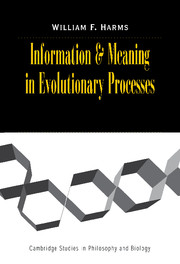Book contents
- Frontmatter
- Contents
- Acknowledgments
- Introduction
- PART I GENERALIZING EVOLUTIONARY THEORY
- 1 Replicator Theories
- 2 Ontologies of Evolution and Cultural Transmission
- PART II MODELING INFORMATION FLOW IN EVOLUTIONARY PROCESSES
- PART III MEANING CONVENTIONS AND NORMATIVITY
- Epilogue: Paley's Watch and Other Stories
- Notes
- Appendix: Proof of Information Gain under Frequency-Independent Discrete Replicator Dynamics for Population of n Types
- References
- Index
1 - Replicator Theories
Their proponents and limitations
Published online by Cambridge University Press: 28 July 2009
- Frontmatter
- Contents
- Acknowledgments
- Introduction
- PART I GENERALIZING EVOLUTIONARY THEORY
- 1 Replicator Theories
- 2 Ontologies of Evolution and Cultural Transmission
- PART II MODELING INFORMATION FLOW IN EVOLUTIONARY PROCESSES
- PART III MEANING CONVENTIONS AND NORMATIVITY
- Epilogue: Paley's Watch and Other Stories
- Notes
- Appendix: Proof of Information Gain under Frequency-Independent Discrete Replicator Dynamics for Population of n Types
- References
- Index
Summary
The idea that culture evolves in a Darwinian way via variation and selection has been around for some time. Evolutionary epistemology, at least in its more ambitious versions, critically depends on the theoretical defensibility of the notion of cultural evolution, although to date there is considerable difference of opinion as to what exactly it is that evolves over cultural history. Current theoretical frameworks for understanding culture this way fall into two categories. The first approach reasons analogically from biological evolution. The gene is taken as the essential ingredient to biological evolution, and it is reasoned that if there is anything sufficiently like a gene in culture, then Darwinian explanations (and expectations) can apply to culture as well as basic biology. In short, Darwinism can apply to culture just in case there is a cultural “replicator.”
The purpose of this chapter is to examine the notion of a replicator, the attempts to apply it to culture, and its shortcomings as a central notion for evolutionary epistemology. This discussion accomplishes several things. It introduces the reader to the most notable attempts to construct an evolutionary theory of culture and to their general level of sophistication. I also spend a considerable amount of time examining their failings. This will demonstrate the pressing need for a nonreplicator model of evolutionary processes, the construction of which is the main task of Part II.
- Type
- Chapter
- Information
- Information and Meaning in Evolutionary Processes , pp. 15 - 51Publisher: Cambridge University PressPrint publication year: 2004



